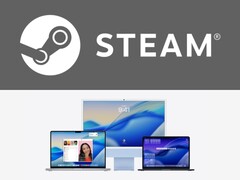Steam has been available on Mac for quite a while now but it was never updated for native support on Apple Silicon. That ends now as the game marketplace app is available for Macs powered by Apple’s M-series chips in a new beta. It is much more optimized and runs notably better compared to its Intel version. This comes as Apple is in the process of fully transitioning to its own silicon and stopping support for Intel based Macs.
The Steam Client Beta announcement shared on the Steam community forum states that the Steam Client and Steam Helper apps now run natively on Apple Silicon. Till now, the Steam app has relied on Rosetta 2 to run on Apple Silicon, which was not the most optimized experience. Steam uses the Chromium browser rendering engine to load most of its web content and the Intel version of the app had to constantly go through the Rosetta layer. Now, Valve has moved the Chromium Embedded Framework from Intel-only to Apple Silicon.
YouTuber Andrew Tsai compared the Intel version with the Apple Silicon version of the Steam app which revealed major performance improvements in startup times, navigation, and overall user experience. There are a couple other macOS dedicated fixes as well including icons not setting automatically for non-Steam games and missing game icon file dialog.
To install the new Steam beta, open the Steam app on Mac, head to Settings, then Interface, and look for ‘Client Beta Participation.’ Click on Steam Beta Update and the app should prompt for a restart. Once restarted, the app will update to the latest beta.
Following WWDC 2025, Apple shared that it will stop launching major updates for Intel-based Macs after macOS Tahoe. As for Rosetta 2, macOS 27 will be the last firmware update supporting it.























